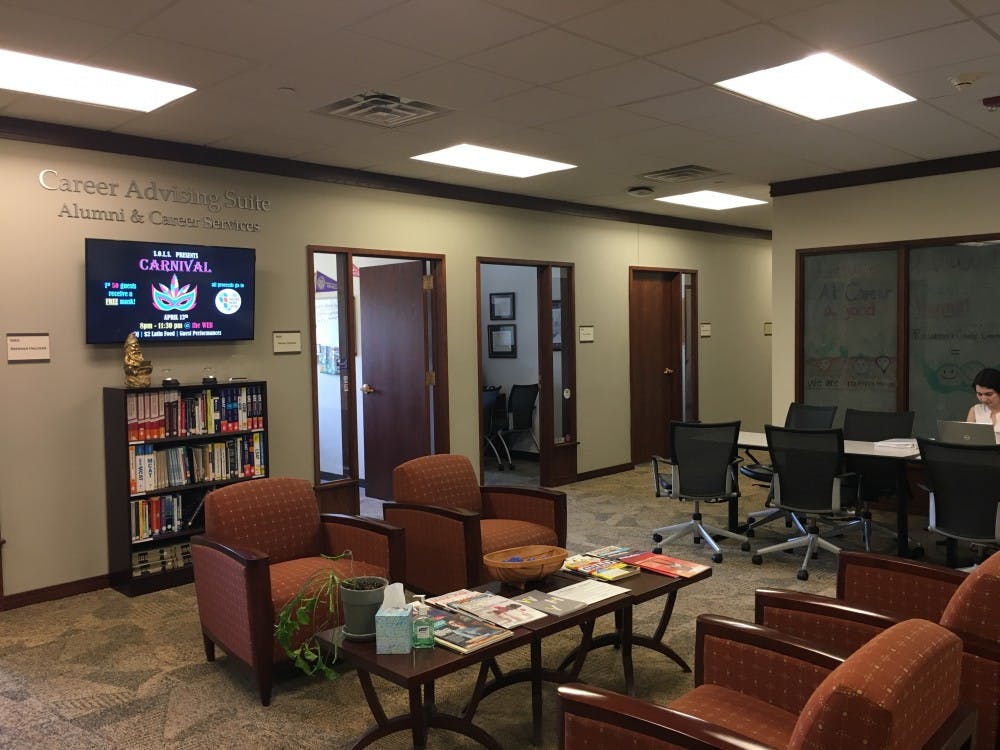University of Richmond students will now have to conduct their internships in their home communities, the city of Richmond or remotely in order to qualify for UR summer fellowship funding.
Students received an email from the Office of Alumni and Career Services on April 2 about changes made to the guidelines for receiving URSF funding or course credit for in-person internships. These revisions were made in an effort to discourage students from traveling this summer because of the COVID-19 pandemic.
Previously, there were no limitations on where students' internships could take place in order to receive URSF funding. Now they must be in students' home communities or in the city of Richmond to qualify for any of the Richmond Guarantee’s eight programs, according to the email.
Brendan Halligan, who is the associate director of experiential learning and assessment and the contact for the E. Claiborne Robins School of Business summer fellowships and spider internship funds, said that an in-person experience within a student's home community could be possible, depending on the public health guidelines at that time.
A home community is “a reasonable commuting distance, so if a student can reasonably live at home and commute to their organization," Halligan said.
Applications for the Richmond Guarantee will be reviewed to ensure that in-person internship sites are a commutable distance from the student's home community, Halligan said.
Additionally, all in-person internships, whether through UR or not, cannot begin until June 15 if the student wants funding or credit, according to the April 2 email.
However, students can now use their Richmond Guarantee toward remote internships if the internships meet certain requirements. These include having clearly stated training, weekly in-person or virtual check-ins with supervisors and opportunities to work with or present to other employees, according to the email.
Sophomore Eleazer Afotey will be doing research remotely, although his math-centered research was originally supposed to be done at UR with mathematics professor James Davis.
Although he is still receiving funding, Afotey was hesitant about how working virtually would impact his experience.
“Personally, I haven’t done research before," he said, "but before I have done a lot of e-group work together, and I think it’s a bit harder working from remote areas.”
Other students have had to give up their summer opportunities, such as sophomore Ally Osterberg, who originally planned to go to Argentina for 10 weeks to intern with a nonprofit called A Pan for the Mango. Osterberg would have been working with children to help them find healthy food options in areas where affordable, good-quality food is sparse, she said.
Enjoy what you're reading?
Signup for our newsletter
“I can’t afford [the trip] without the guarantee, so I can’t do that anymore,” Osterberg said. “They said I’m welcome back next year, but it still sucks.”
Osterberg also brought up how students who live in smaller towns or rural areas, like herself, have fewer opportunities than those who live in or near big cities.
"In that way it is kind of unfair and, yes, you still have Richmond you can go to, but still, if you live in New York, you’re just going to have naturally so many more opportunities than a lot of other students do,” Osterberg said.
There are no exceptions for students who already accepted an internship in a place outside of their home community or Richmond.
“What I would say is that because the information [about COVID-19] is going to change so rapidly, there’s not an exception process that’s going to be possible just because it's not possible to determine what areas are going to be safer day-to-day for an in-person experience,” Halligan said.
Halligan suggested students who need an internship to graduate or maintain a scholarship should follow up with the directors of their programs. They can help guide students on their program's process and work with students to make sure they fulfill their requirements, Halligan said.
“We really understand that this is a difficult time for students, and even though we are all in different places right now, we are still available to assist and support students,” Halligan said. “I would really encourage students that would like some assistance with their internship search to make an appointment with a career advisor through SpiderConnect.”
Contact news writer Maeve McCormick at maeve.mccormick@richmond.edu.
Support independent student media
You can make a tax-deductible donation by clicking the button below, which takes you to our secure PayPal account. The page is set up to receive contributions in whatever amount you designate. We look forward to using the money we raise to further our mission of providing honest and accurate information to students, faculty, staff, alumni and others in the general public.
Donate Now



